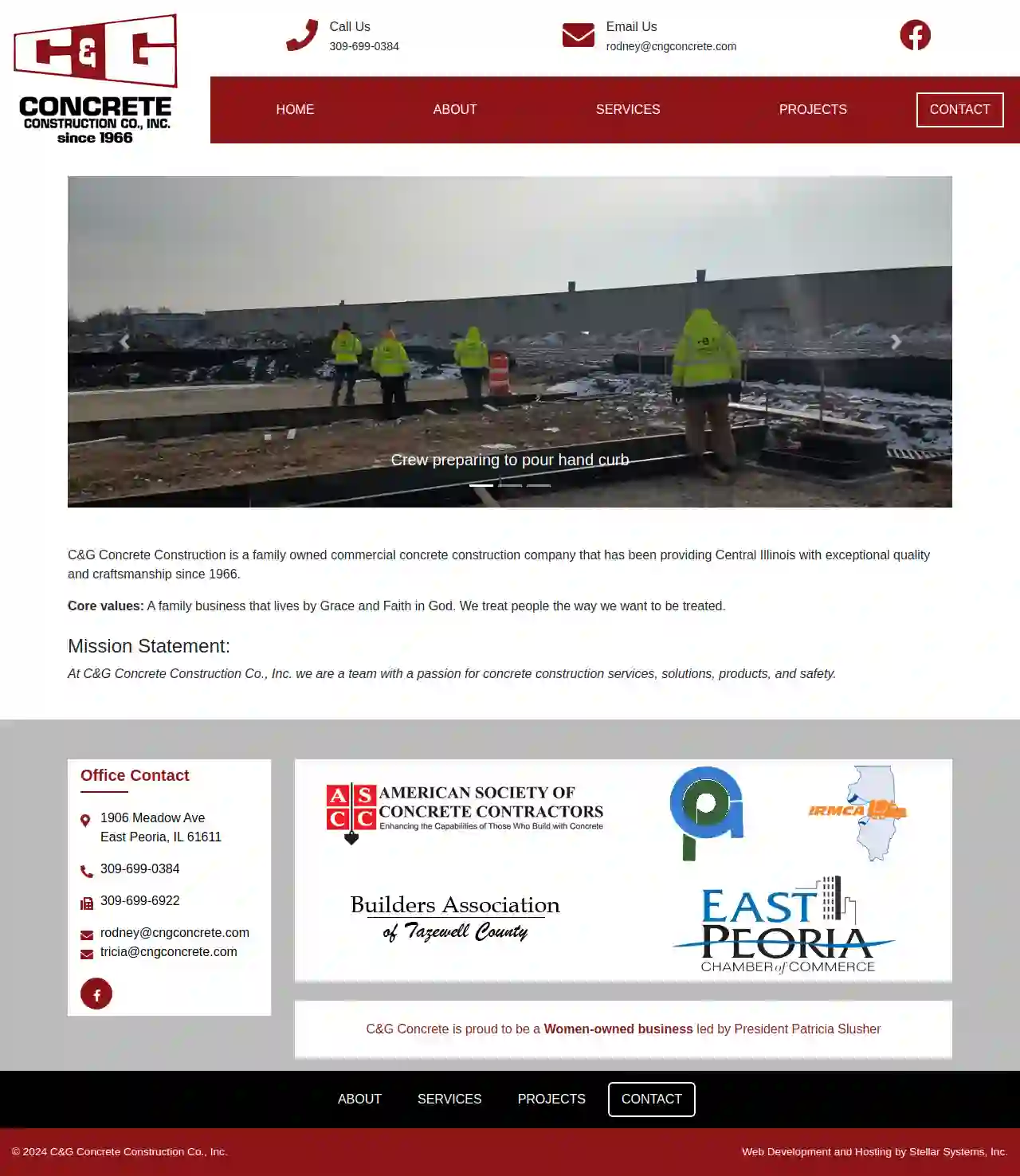Excavation Contractors Peoria
Find Excavation Contractors Near Me in Peoria
Receive 3 FREE Excavation Contractors quotes for your project today! Compare profiles, reviews, accreditations, portfolio, etc... and choose the best deal.
- J.
J.C Construction
52 reviewsPeoria, US- Services
- Why Us?
Get Quote - Lo
Lockwood Excavating & Construction Inc
33 reviewsPeoria, US- Services
- Why Us?
Get Quote - Ho
Hofstatter Material & Services
4.927 reviewsPeoria, US- Services
- Why Us?
Get Quote - Mi
Mike Yordy Excavation
1Peoria, US- Services
- Why Us?
Get Quote 
C & G Concrete Construction Co., Inc.
53 reviews1906 Meadow Ave, East Peoria, 61611, USC&G Concrete Construction Co., Inc. is a family-owned commercial concrete construction company that has been serving Central Illinois with exceptional quality and craftsmanship since 1966. Core Values: We are a family business that lives by Grace and Faith in God. We treat people the way we want to be treated. Mission Statement: At C&G Concrete Construction Co., Inc. we are a team with a passion for concrete construction services, solutions, products, and safety.
- Services
- Why Us?
- Our Team
- Gallery
Get Quote
Oakwood Landscaping
49 reviewsBox 9124, Peoria, 61612, USOakwood Landscaping: Your Trusted Partner for Beautiful Landscapes Oakwood Landscaping, established in 2001 by Steve Wallace, has been serving the Peoria, IL area for over two decades. With a deep understanding of the landscaping industry, Steve brings years of experience and a commitment to quality to every project. We specialize in both residential and commercial landscaping, offering a comprehensive range of services to enhance your property's beauty and functionality. At Oakwood Landscaping, we take pride in our dedicated team of professionals. We are committed to delivering the highest level of service and attention to detail, ensuring your complete satisfaction. Whether you need a stunning landscape design, meticulous maintenance, or reliable snow removal, we are here to meet your needs. We believe in building lasting relationships with our clients. Contact us today for a free estimate and let us help you transform your outdoor space into a haven of beauty and tranquility.
- Services
- Why Us?
- Gallery
Get Quote
Kimble Landscaping & Excavating Inc
2.910 reviews22811 Hardscrabble Rd., Sparland, 61565, USWITH KIMBLE EXCAVATING, THERE'S NO JOB TOO BIG OR TOO SMALL Call us today to get started on your next project. A FEW OF OUR PROJECTS FOUNDATION REPAIR Your building may need an inspection if you notice water logging at the foundation instead of it flowing away from your home. Oftentimes, water will get trapped within the foundation, freeze, and then cause the foundation to crack. View more EXCAVATING From grading and finish seeding to ponds and creek crossings, we offer a wide variety of excavating services to meet your needs. View more CONCRETE & ROCK We can handle any concrete and rock installations or repairs for residential and agricultural settings. View more SERVING THE FOLLOWING COMMUNITIES FOR OVER 40 YEARS: Peoria, Dunlap, Washington, East Peoria, Germantown Hills, Princeville, Hanna City, Spring Bay, Chillicothe, Bartonville, Sparland, Lacon, Henry
- Services
- Why Us?
- Gallery
Get Quote- ED
EDM Universal Services LLC
4.85 reviewsPeoria, US- Services
- Why Us?
Get Quote - Sl
Slack Excavating
41 reviewsPeoria, US- Services
- Why Us?
Get Quote - Bi
Billy Daniel Excavating Inc
55 reviewsPeoria, US- Services
- Why Us?
Get Quote
Over 21,512+ Excavation Pros on our platform
Our excavation contractors operate in Peoria and surroundings!
ExcavationHQ has curated and vetted the Best Excavation Contractors in and around Peoria. Find a reliable contractor today.
Frequently Asked Questions About Excavation Contractors
- Trench Collapses: Unstable trench walls can cave in, posing a severe risk to workers. Proper shoring and sloping are crucial safety measures.
- Utility Damage: Striking underground utilities (gas, water, electric) can cause leaks, explosions, or electrocution. Accurate utility locates and careful digging are essential.
- Falling Objects: Materials or equipment falling into excavations can injure workers. Securing work areas and using appropriate safety gear is vital.
- Equipment Accidents: Operating heavy machinery involves risks of rollovers, collisions, or mechanical failures. Trained operators and proper equipment maintenance are critical.
- Environmental Hazards: Excavated soil might contain hazardous materials (asbestos, lead). Proper testing and disposal procedures are necessary.
- Basement Size: The larger the basement, the more excavation is required, increasing the cost.
- Soil Type: Excavating rocky or dense clay soil is generally more expensive than loose soil.
- Accessibility: Difficult-to-access sites might require specialized equipment or more labor, driving up costs.
- Foundation Type: The chosen foundation type (full basement, crawl space, slab) affects excavation needs.
- Underpinning: If underpinning (strengthening existing foundations) is necessary, it significantly increases costs.
- Disposal Fees: Hauling excavated soil to disposal sites adds to the overall expense.
- Project Size and Scope: The larger and more complex the excavation, the higher the cost.
- Soil Type: Different soil types require different equipment and techniques, impacting costs. Rocky or clay-rich soil can be more expensive to excavate than loose soil.
- Accessibility: Difficult-to-access sites might require specialized equipment or additional labor, increasing expenses.
- Disposal Costs: Hauling away excavated material (soil, rocks, etc.) to disposal sites incurs additional fees.
- Permits and Inspections: Depending on local regulations, permits and inspections might be required, adding to the overall cost.
- Mechanical Excavation: Utilizing heavy equipment like excavators, backhoes, bulldozers, and loaders, suitable for most projects.
- Hand Excavation: Using hand tools (shovels, picks) for smaller excavations or delicate work near utilities.
- Blasting: Employing explosives to break up rock or hard materials, typically for large-scale projects.
- Hydro Excavation: Using high-pressure water jets to loosen and remove soil, often used for locating utilities or delicate excavation.
- Vacuum Excavation: Employing a vacuum system to suck up excavated material, suitable for safe excavation near utilities or in confined spaces.
What are the risks associated with excavation?
How much does it cost to excavate a basement?
How much does excavation cost?
What are the different methods of excavation?
What are the risks associated with excavation?
- Trench Collapses: Unstable trench walls can cave in, posing a severe risk to workers. Proper shoring and sloping are crucial safety measures.
- Utility Damage: Striking underground utilities (gas, water, electric) can cause leaks, explosions, or electrocution. Accurate utility locates and careful digging are essential.
- Falling Objects: Materials or equipment falling into excavations can injure workers. Securing work areas and using appropriate safety gear is vital.
- Equipment Accidents: Operating heavy machinery involves risks of rollovers, collisions, or mechanical failures. Trained operators and proper equipment maintenance are critical.
- Environmental Hazards: Excavated soil might contain hazardous materials (asbestos, lead). Proper testing and disposal procedures are necessary.
How much does it cost to excavate a basement?
- Basement Size: The larger the basement, the more excavation is required, increasing the cost.
- Soil Type: Excavating rocky or dense clay soil is generally more expensive than loose soil.
- Accessibility: Difficult-to-access sites might require specialized equipment or more labor, driving up costs.
- Foundation Type: The chosen foundation type (full basement, crawl space, slab) affects excavation needs.
- Underpinning: If underpinning (strengthening existing foundations) is necessary, it significantly increases costs.
- Disposal Fees: Hauling excavated soil to disposal sites adds to the overall expense.
How much does excavation cost?
- Project Size and Scope: The larger and more complex the excavation, the higher the cost.
- Soil Type: Different soil types require different equipment and techniques, impacting costs. Rocky or clay-rich soil can be more expensive to excavate than loose soil.
- Accessibility: Difficult-to-access sites might require specialized equipment or additional labor, increasing expenses.
- Disposal Costs: Hauling away excavated material (soil, rocks, etc.) to disposal sites incurs additional fees.
- Permits and Inspections: Depending on local regulations, permits and inspections might be required, adding to the overall cost.
What are the different methods of excavation?
- Mechanical Excavation: Utilizing heavy equipment like excavators, backhoes, bulldozers, and loaders, suitable for most projects.
- Hand Excavation: Using hand tools (shovels, picks) for smaller excavations or delicate work near utilities.
- Blasting: Employing explosives to break up rock or hard materials, typically for large-scale projects.
- Hydro Excavation: Using high-pressure water jets to loosen and remove soil, often used for locating utilities or delicate excavation.
- Vacuum Excavation: Employing a vacuum system to suck up excavated material, suitable for safe excavation near utilities or in confined spaces.